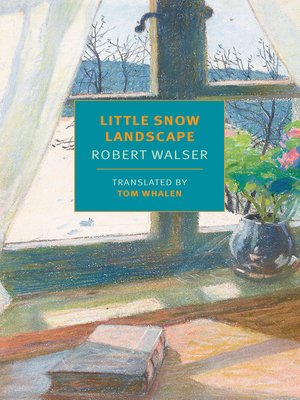
Sign up to save your library
With an OverDrive account, you can save your favorite libraries for at-a-glance information about availability. Find out more about OverDrive accounts.
Find this title in Libby, the library reading app by OverDrive.



Search for a digital library with this title
Title found at these libraries:
| Library Name | Distance |
|---|---|
| Loading... |
A collection of previously unpublished short prose by one of the most influential figures of twentieth-century fiction.
Little Snow Landscape opens in 1905 with an encomium to Robert Walser’s homeland and concludes in 1933 with a meditation on his childhood in Biel, the town of his birth, published in the last of his four years in the cantonal mental hospital in Waldau outside Bern. Between these two poles, the book maps Walser’s outer and inner wanderings in various narrative modes. Here you find him writing in the persona of a girl composing an essay on the seasons, of Don Juan at the moment he senses he’s outplayed his role, and of Turkey’s last sultan shortly after he’s deposed. In other stories, a man falls in love with the heroine of the penny dreadful he’s reading (and she with him?), and the lady of a house catches her servant spread out on the divan casually reading a classic. Three longer autobiographical stories—“Wenzel,” “Würzburg,” and “Louise”—brace the whole. In addition to a representative offering of Walser’s short prose, of which he was one of literature’s most original, multifarious, and lucid practitioners, Little Snow Landscape forms a kind of novel, however apparently plotless, from the vast unfinishable one he was constantly writing.
Little Snow Landscape opens in 1905 with an encomium to Robert Walser’s homeland and concludes in 1933 with a meditation on his childhood in Biel, the town of his birth, published in the last of his four years in the cantonal mental hospital in Waldau outside Bern. Between these two poles, the book maps Walser’s outer and inner wanderings in various narrative modes. Here you find him writing in the persona of a girl composing an essay on the seasons, of Don Juan at the moment he senses he’s outplayed his role, and of Turkey’s last sultan shortly after he’s deposed. In other stories, a man falls in love with the heroine of the penny dreadful he’s reading (and she with him?), and the lady of a house catches her servant spread out on the divan casually reading a classic. Three longer autobiographical stories—“Wenzel,” “Würzburg,” and “Louise”—brace the whole. In addition to a representative offering of Walser’s short prose, of which he was one of literature’s most original, multifarious, and lucid practitioners, Little Snow Landscape forms a kind of novel, however apparently plotless, from the vast unfinishable one he was constantly writing.







